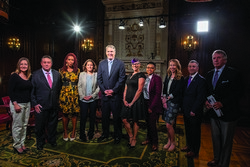The annual Conversation and Action series, which explored a range of social and policy issues related to gender inequality, began in Wilson Hall on Wednesday, Sept. 25.
The two-day event consisted of a dynamic discussion that included diverse perspectives on a current topic of interest to feminist scholars and activists. The theme of this year’s event was Title IX, sexual assault, and college campuses.
Jack Ford, an award-winning journalist and former prosecutor, led the discussion.
Panelists included Wagatwe Wanjuki, feminist anti-violence activist, speaker, writer, and digital strategist; Andrew T. Miltenberg, Esq, veteran trial lawyer and due process advocate; Laura Luciano, victim advocate, Associate Director of the Office for Violence Prevention and Victim Assistance; Jordan Draper, Ph.D., Title IX Coordinator and Dean of Students, TCNJ; Jennifer McGovern, Ph.D., MU Assistant Professor of Sociology and NCAA Faculty Athletics Representative; Stephanie Wright, Assistant Director of Student Conduct, Rutgers and former Greek Life Leadership Coordinator, Montclair State University; and, Michael J. Rein, Deputy Chief of University Police, Institutional Planning and Operations and University Public Safety at Rutgers.
Ford guided the discussion, proposing a hypothetical dilemma constructed from real-life cases of sexual assault and Title IX advocacy. He described a small college campus where a “clearly distraught” woman calls campus police and said, “I think I’ve been assaulted.”
Rein described how his office at Rutgers would handle a report of assault. The police would try to respond to her location and ask if she was injured. When calm, they would pose tougher questions such as “Do you know who assaulted you? Do you remember any sights or smells?”
 He explained that the goal is to get as much information as possible up front to minimize the amount of time the victims need to tell their story.
He explained that the goal is to get as much information as possible up front to minimize the amount of time the victims need to tell their story.
All of the questions that the police pose is focused on consent or lack-there-of. “[The outcome of the investigation] might be a change in class schedule or change of dorm room at that time if the victim has classes with the person they think [assaulted them]” Rein said.
Luciano added that police should offer the survivor an advocate to speak with. Law enforcement is fact-based, and an advocate would be able to make the survivor more comfortable when being asked potentially uncomfortable questions.
Miltenberg took a different approach to the scenario, and said, “[his] counterparts are looking at the issue in a victim centric and trauma informed way… “when the police speak to [his] client they already have bias from the victim when speaking to the person accused.” He believes that the process becomes the punishment for the accused and that some of clients attempted suicide in the trail process.
The dialogue evolved to incorporate the issues of consent and race in instances of sexual assault.
On consent, McGovern said, “You cannot consent when you are incapacitated.” Luciano explained that the issue of consent and being unable to determine its presence is why sexual assault cases go away on college campuses.
Regarding race, McGovern said that the authorities are less likely to believe people of low socioeconomic status and people of color. “Black athletes and black males are wrongfully convicted all the time,” she explained.
Ford furthered the dialogue and described that the girl from his initial scenario remembered that it was a black football player on scholarship who assaulted her. Since the assailant was from the University, Ford asked what would happen in this case.
Draper finds that it is her job to protect all parties involved and not have the information all out. McGovern believes that in this case that athletics should not be involved, but the player can get boosters. Stephanie is very confident that the trained professionals at the university would be able to handle this situation, while Andrew believes that someone outside of the university should be the one handling it.
One problem that we see with sexual violence according to Luciano is that “they are not getting reported and a vast majority of survivors are not telling anyone instead they are just trying to get through their days.”
The final question was posed was “what do we need to do?” The panelists agreed that we need to start having conversations earlier about how to have healthy, safe and consensual sex. Draper said “[the panelists] all come to support in different ways. That’s what this event was all about- to show all sides of support that someone who is in this situation has at their fingertips.”
After the event, Ford said, “Going in I realized it’s one of those issues that gives rise to passionate opinions- how to deal- my hope was that we’d make this rational way underscore how these issues are complex and problematic.”
Tyler Castro, a Senior Psychology student who attended the event, said, “Title IX is important to me and the protection it provides for victims is essential and on the recent policy changes because of Betsy DeVos, increases the burden of proofs on the victims and there is incredible opportunity for students here to see professionals weigh in on this topic tonight.”
Lisa Dinella, Ph.D., the Principal Investigator of the Gender Development Laboratory and Director of Program in Gender and Intersectionality Studies, who organized the event, said, “The goal is to really have dynamic divergent perspectives. We so often have conversations only one side or the other. This event was about the students, student leaders today, more than ever, ready to make change and the university is the place where that starts.”
The panel sparked conversations that carried on to the next day with four workshops running from 10:00 am until 6:00 pm.
The last session on day two consisted of a conversation that forced students to think about what these topics mean for Monmouth. In response, some students started an intersectionality club to take action and evoke change on campus.
PHOTOS COURTESY of Monmouth University



